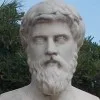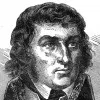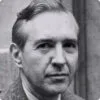Education must be based on two things: ethics and prudence; ethics in order to develop your good qualities, prudence to protect you from other people’s bad ones. If you attach too great an importance to goodness, you produce credulous fools; if you’re too prudent, you produce self-serving, scheming rogues.
[L’Éducation doit porter sur deux bases, la morale et la prudence ; la morale, pour appuyer la vertu ; la prudence, pour vous défendre contre les vices d’autrui. En faisant pencher la balance du côté de la morale, vous ne faites que des dupes ou des martyrs; en la faisant pencher de l’autre côté, vous faites des calculateurs égoïstes.]
Nicolas Chamfort (1741-1794) French writer, epigrammist (b. Nicolas-Sébastien Roch)
Products of Perfected Civilization [Produits de la Civilisation Perfectionée], Part 1 “Maxims and Thoughts [Maximes et Pensées],” ch. 5, ¶ 321 (1795) [tr. Parmée (2003), ¶ 205]
(Source)
(Source (French)). Alternate translations:Education must have two foundations -- morality as a support for virtue, prudence as a defence for self against the vices of others. By letting the balance incline to the side of morality, you only make dupes or martyrs; by letting it incline to the other, you make calculating egoists.
[tr. Hutchinson (1902)]Education should rest on the dual support of moral philosophy and prudence, moral philosophy as the stay of virtue, and prudence as a shield against the vice in others. If you tip the scale on the moral side you will produce none but dupes and martyrs, and by tilting it in the other direction you will develop a quality of selfish calculation only.
[tr. Mathers (1926)]Education should be constructed on two bases: morality and prudence. Morality in order to assist virtue, and prudence in order to defend you against the vices of others. In tipping the scales toward morality, you merely produce dupes and martyrs. In tipping it the other way, you produce egotistical schemers.
[tr. Merwin (1969)]Education must have two foundations, morality and carefulness: morality to support virtue; carefulness to defend against others' vices. By inclining this balance to the side of morality, you only make dupes and martyrs; by inclining it to carefulness, you make calculating egoists.
[tr. Siniscalchi (1994)]
Quotations about:
education
Note not all quotations have been tagged, so Search may find additional quotes on this topic.
I know no safe depository of the ultimate powers of the society, but the people themselves: and if we think them not enlightened enough to exercise their controul with a wholsome discretion, the remedy is, not to take it from them, but to inform their discretion by education. this is the true corrective of abuses of constitutional power.
Thomas Jefferson (1743-1826) American political philosopher, polymath, statesman, US President (1801-09)
Letter (1820-09-28) to William Charles Jarvis
(Source)
I am the very model of a modern Major-General,
I’ve information vegetable, animal, and mineral,
I know the kings of England, and I quote the fights historical
From Marathon to Waterloo, in order categorical;
I’m very well acquainted, too, with matters mathematical,
I understand equations, both the simple and quadratical,
About binomial theorem I’m teeming with a lot o’ news,
With many cheerful facts about the square of the hypotenuse.
I’m very good at integral and differential calculus;
I know the scientific names of beings animalculous:
In short, in matters vegetable, animal, and mineral,
I am the very model of a modern Major-General.
A book is a mirror: if an ape looks into it, an apostle is unlikely to look out.
Georg C. Lichtenberg (1742-1799) German physicist, writer
Aphorisms, Notebook F, #17 (1776-79) [tr. Hollingdale (1990)]
(Source)
This is nearly mirrored by Notebook E, # 49 (1775-76), "A book is a mirror: if an ape looks into it an apostle is hardly likely to look out."
Alternate translations:A book is a mirror: when a monkey looks in, no apostle can look out.
[tr. Mautner and Hatfield (1959)]A book is a mirror: if an ape looks into it, an apostle is unlikely to look out.
[tr. Tester (2012)]
The Priesthood, have in all ancient Nations, nearly monopolized Learning. Read over again all the Accounts We have of Hindoos, Chaldeans, Persians Greeks, Romans, Celts, Teutons, We Shall find that Priests had all the Knowledge, and really governed all Mankind. Examine Mahometanism. Trace Christianity from its first Promulgation, Knowledge has been almost exclusively confined to the Clergy. And even since the Reformation, when or where has existed a Protestant or dissenting Sect, who would tolerate, A free Inquiry? The blackest Billingate, the most ungentlemanly insolence, the most yahooish brutality, is patiently endured countenanced propagated and applauded: But touch a solemn Truth in collission with a dogma of a Sect, though capable of the clearest proof; and you will Soon find you have disturbed a Nest, and the hornets will swarm about your legs and hands and fly into your face and Eyes.
Every child must be encouraged to get as much education as he has the ability to take. We want this not only for his sake — but for the nation’s sake. Nothing matters more to the future of our country: not military preparedness — for armed might is worthless if we lack the brain power to build a world of peace; not our productive economy — for we cannot sustain growth without trained manpower; not our democratic system of government — for freedom is fragile if citizens are ignorant.
Lyndon B. Johnson (1908-1973) American politician, educator, US President (1963-69)
Speech (1965-01-12), “Toward Full Educational Opportunity,” Joint Session of Congress
(Source)
Correction does much, but encouragement does more.
Johann Wolfgang von Goethe (1749-1832) German poet, statesman, scientist
(Attributed) [tr.Wenckstern (1853)]
(Source)
The mind is not a vessel to be filled, but a fire to be kindled.
EDUCATION, n. That which discloses to the wise and disguises from the foolish their lack of understanding.
Ambrose Bierce (1842-1914?) American writer and journalist
“Education,” The Cynic’s Word Book (1906)
(Source)
Included in The Devil's Dictionary (1911). Originally published in the "Devil's Dictionary" column in the San Francisco Wasp (1882-12-23).
There are two things which cannot be attacked in front: ignorance and narrow-mindedness. They can only be shaken by the simple development of the contrary qualities. They will not bear discussion.
John Dalberg, Lord Acton (1834-1902) British historian, politician, writer
Letter (1861-01-23) to Richard Simpson
(Source)
Most people are willing to pay more to be amused than to be educated.
Robert C. Savage (1914-1987) American Christian missionary, pastor, hymnologist, author
Life Lessons (1993)
(Source)
Wear your learning, like your watch, in a private pocket; and do not pull it out and strike it, merely to show that you have one. If you are asked what o’clock it is, tell it; but do not proclaim it hourly and unasked, like the watchman.
Lord Chesterfield (1694-1773) English statesman, wit [Philip Dormer Stanhope]
Letter to his son, #142 (22 Feb 1748)
(Source)
As it is better to give than to receive, so it is better to share the fruit of one’s contemplation than merely to contemplate.
[Sicut enim maius est illuminare quam lucere solum, ita maius est contemplata aliis tradere quam solum contemplari.]
Thomas Aquinas (1225-1274) Italian friar, philosopher, theologian
Summa Theologica, 2a-2ae, “Treatise on the States of Life,” Q.188 “Of the Different Kinds of Religious Life” (1265-1274)
(Source)
Alt. trans.:
- "Just as it is better to illuminate than merely to shine, so to pass on what one has contemplated is better than merely to contemplate."
- "Better to illuminate than merely to shine; to deliver to others contemplated truths than merely to contemplate."
- "Better to light up than merely to shine, to deliver to others contemplated truths than merely to contemplate." [Source]
- "For even as it is better to enlighten than merely to shine, so it is better to give to others the fruits of one's contemplation than merely to contemplate." [Source]
To teach is to learn twice.
[Enseigner, c’est apprendre deux fois.]
Joseph Joubert (1754-1824) French moralist, philosopher, essayist, poet
Pensées [Thoughts], ch. 19 “De l’Éducation [On Education],” ¶ 88 (1850 ed.) [tr. Collins (1928), ch. 18]
(Source)
(Source (French)). Alternate translation:To teach is to learn twice over.
[tr. Lyttelton (1899), ch. 18, ¶ 18]
This is in fact the test and use of a man’s education, that he finds pleasure in the exercise of his mind.
Jacques Barzun (1907-2012) French-American historian, educator, polymath
Essay (1950-10-15), “The Educated Man,” Life Magazine
(Source)
More commonly given as "The test and use of a man's education is that he finds pleasure in the exercise of his mind."
Essay collected, under the same name, in Barzun, Begin Here: The Forgotten Conditions of Teaching and Learning, ch. 15 (1991).
An education isn’t how much you have committed to memory, or even how much you know. It’s being able to differentiate between what you do know and what you don’t. It’s knowing where to go to find out what you need to know, and it’s knowing how to use the information once you get it.
William Feather (1889-1981) American publisher, author
(Attributed)
The original source for this has not been found. It is quoted (without source) in Carman Fish, "The Safety Valve" column, National Safety News (1960-01). Prior to that, it is also quoted in Telephony Magazine, Vol. 150 (1956), p. 23 (but that article itself notes it is quoting from an issue of Copperweld Magazine).
The first two sentences are often credited to Anatole France, but this seems to be a fairly recent (1990s?) misattribution.
Another variant (attributed to France, uncited; e.g.): "True education is the ability to discern the difference between what you do know and what you don't."
It is the mark of an educated mind to be able to entertain a thought without accepting it.
Aristotle (384-322 BC) Greek philosopher
(Spurious)
First attributed to Aristotle in Lowell L. Bennion, Religion and the Pursuit of Truth (1959). Unfound as such.
Sometimes thought (though I feel it's a bit of a stretch) a misinterpretation of Nicomachean Ethics 1.3.4 (1094b): "For it is the mark of an educated person to search for the same kind of clarity in each topic to the extent that the nature of the matter accepts it."
More discussion of this quotation:
I have learned throughout my life as a composer chiefly through my mistakes and pursuits of false assumptions, not by my exposure to founts of wisdom and knowledge.
A little learning is a dangerous thing;
Drink deep, or taste not the Pierian Spring:
There shallow draughts intoxicate the brain,
And drinking largely sobers us again.Alexander Pope (1688-1744) English poet
“An Essay on Criticism,” Part 2, ll. 15-18 (1711)
(Source)
In Greek mythology, the Pierian Spring was sacred to the Muses, representing the metaphorical source of knowledge.
The first line is more commonly paraphrased as "A little knowledge is a dangerous thing."
Liberty without learning is always in peril; learning without liberty is always in vain.
John F. Kennedy (1917-1963) US President (1961-63)
Speech (1963-05-18), Convocation, Vanderbilt University, Nashville
(Source)
CALVIN: I don’t want to go to school. I don’t want to know anything new. I already know more than I want to! I liked things better when I didn’t understand them! The fact is, I’m being educated against my will! My rights are being trampled!
HOBBES: Is it a right to remain ignorant?
CALVIN: I don’t know, but I refuse to find out!
I have not placed reading before praying because I regard it more important, but because, in order to pray aright, we must understand what we are praying for.
Angelina Grimké Weld (1805-1879) American abolitionist, women's rights activist
“Appeal to the Christian Women of the South,” Anti-Slavery Examiner (Sep 1836)
(Source)
For as the problem of civil rights has grown in urgency it has also grown in complexity. We must open the doors of opportunity. But we must also equip our people to walk through those doors.
Lyndon B. Johnson (1908-1973) American politician, educator, US President (1963-69)
Speech (1964-12-10), National Urban League, New York
(Source)
Children have more need of models than of critics.
[Les enfants ont plus besoin de modèles que de critiques.]
Joseph Joubert (1754-1824) French moralist, philosopher, essayist, poet
Pensées [Thoughts], ch. 19 “De l’Éducation [On Education],” ¶ 3 (1850 ed.) [tr. Calvert (1866), ch. 14]
(Source)
Sometimes attributed to Carolyn Coats.
(Source (French)). Alternate translations:Children have more need of models than of critics.
[tr. Attwell (1896), ¶ 261]Children need models rather than critics.
[tr. Lyttelton (1899), ch. 18, ¶ 1]Children. Need models more than critics.
[tr. Auster (1983), 1800 entry]
The possession of facts is knowledge; the use of them is wisdom; the choice of them, education. Knowledge is not power but riches, and like them, has its value in spending.
To be born enlightened: that is highest. To study and so become enlightened: that is next. To feel trapped and so study: that is third. To feel trapped and never study: that is the level of the common people, the lowest level.
[孔子曰、生而知之者、上也、學而知之者、次也、 困而學之、又其次也、困而不學、民斯爲下矣。]
Confucius (c. 551- c. 479 BC) Chinese philosopher, sage, politician [孔夫子 (Kǒng Fūzǐ, K'ung Fu-tzu, K'ung Fu Tse), 孔子 (Kǒngzǐ, Chungni), 孔丘 (Kǒng Qiū, K'ung Ch'iu)]
The Analects [論語, 论语, Lúnyǔ], Book 16, verse 9 (16.9) (6th C. BC – AD 3rd C.) [tr. Hinton (1998)]
(Source)
Brooks says this was interpolated into Book 16 at the time of Book 18. (Source (Chinese)). Alternate translations:Those who are born with the possession of knowledge are the highest class of men. Those who learn, and so, readily, get possession of knowledge, are the next. Those who are dull and stupid, and yet compass the learning, are another class next to these. As to those who are dull and stupid and yet do not learn; -- they are the lowest of the people
[tr. Legge (1861), sec. 2]They whose knowledge comes by birth are of all men the first (in understanding); they to whom it comes by study are next; men of poor intellectual capacity, who yet study, may be added as a yet inferior class; and lowest of all are they who are poor in intellect and never learn.
[tr. Jennings (1895)]The highest class of men are those who are born with a natural understanding. The next class are those who acquire understanding by study and application. There are others again who are born naturally dull, but who yet by strenuous efforts, try to acquire understanding: such men may be considered the next class. Those who are born naturally dull and yet will not take the trouble to acquire understanding: such men are the lowest class of the people.
[tr. Ku Hung-Ming (1898)]Those who have innate wisdom take the biggest rank. Those who acquire it by study rank next. Those who learn despite natural limitations come next. But those who are of limited ability and yet will not learn, -- these form the lowest class of men.
[tr. Soothill (1910)]Those who know instinctively (as at birth) are the highest; those who study and find out, come next; those who are hampered and study come next. Those who are boxed in and do not study constitute the lowest people.
[tr. Pound (1933)]Best are those who are born wise. Next are those who become wise by learning. After come those who have to toil painfully in order acquire learning. Finally, to the lowest class of the common people belong those who toil painfully without ever managing to learn.
[tr. Waley (1938)]Those born with an understanding of the universe belong to the highest type of humanity. Those who understand it as the result of study come second. Those who study it with great difficulty come third. Because, owing to the difficulty, they do not study, the people come last.
[tr. Ware (1950)]Those who are born with knowledge are the highest. Next come those who attain knowledge through stud. Next again come those who turn to study after having been vexed by difficulties. The common people, in so far as they make no effort to study even after having been vexed by difficulties, are the lowest.
[tr. Lau (1979)]Those who know things from birth come first; those who know things from study come next; those who study things although the find them difficult come next to them; and those who do not study because they find things difficult, that is to say the common people, come last.
[tr. Dawson (1993)]Those who have innate knowledge are the highest. Next come those who acquire knowledge through learning. Next again come those who learn through the trials of life. Lowest are the common people who go through the trials of life without learning anything.
[tr. Leys (1997)]Those who know it at birth belong to the highest category; those who know it through learning belong to the second category; those hwo learn it when baffled belong to the third category; those who do not learn even when baffled -- such people belong to the lowest category.
[tr. Huang (1997)]It is the first class that one gets the knowledge because of one's innateness, it is the second class that one gets the knowledge because of one's studying, it is the third class that one gets studying because of one's encountering the difficulty, and it is under the class that one who does not study even if one encounters difficulties.
[tr. Cai/Yu (1998), #435]Knowledge (zhi 知) acquired through a natural propensity for it is its highest level; knowledge acquired through study is the next highest; something learned in response to difficulties encountered is again the next highest. But those among the common people who do not learn even when vexed with difficulties -- they are at the bottom of the heap.
[tr. Ames/Rosemont (1998)]Those who know from birth are the highest, those who know it from study are next, those who despite difficulties study it are next after that. Those who in difficulties do not study: these are the lowest.
[tr. Brooks/Brooks (1998)]Those who are born understanding it are the best; those who come to understand it through learning are second. Those who find it difficult to understand and yet persist in their studies come next. People who find it difficult to understand but do not even try to learn are the worst of all.
[tr. Slingerland (2003)]Those born with understanding rank highest. Those who study and gain understanding come next. Those who face difficulties and yet study—they are next. Those who face difficulties but never study—they are the lowest type of people.
[tr. Watson (2007)]Those who are born with knowledge are at the top. Next are those who acquire knowledge through learning. Behind them are those who have difficulties [absorbing knowledge] but are still determined to learn. And at the bottom are people who have difficulties [absorbing knowledge] and do not even attempt to learn.
[tr. Chin (2014)]
This appears to be the source of the following aphorism frequently attributed to Confucius, and recorded in James Wood, ed., Dictionary of Quotations (1893):By three methods we may learn wisdom: First, by reflection, which is noblest; Second, by imitation, which is easiest; and third by experience, which is the bitterest.
For more discussion of that Wood "translation":
The beginning of wisdom is the most sincere desire for instruction,
and concern for instruction is love of her,
and love of her is the keeping of her laws,
and giving heed to her laws is assurance of immortality,
and immortality brings one near to God,
so the desire for wisdom leads to a kingdom.The Bible (The Old Testament) (14th - 2nd C BC) Judeo-Christian sacred scripture [Tanakh, Hebrew Bible], incl. the Apocrypha (Deuterocanonicals)
Wisdom of Solomon 6:17-20 [NRSV (2021 ed.)]
(Source)
Alternate translations:For the very true beginning of her is the desire of discipline; and the care of discipline is love;
And love is the keeping of her laws; and the giving heed unto her laws is the assurance of incorruption;
And incorruption maketh us near unto God:
Therefore the desire of wisdom bringeth to a kingdom.
[KJV (1611)]For the beginning of her is the most true desire of discipline.
And the care of discipline is love: and love is the keeping of her laws: and the keeping of her laws is the firm foundation of incorruption:
And incorruption bringeth near to God.
Therefore the desire of wisdom bringeth to the everlasting kingdom.
[DRA (1899); 6:18-21]Of her the most sure beginning is the desire for discipline, care for discipline means loving her,
loving her means keeping her laws,
obeying her laws guarantees incorruptibility,
incorruptibility brings near to God;
thus desire for Wisdom leads to sovereignty.
[JB (1966)]Wisdom begins when you sincerely want to learn. To desire Wisdom is to love her; to love her is to keep her laws; to keep her laws is to be certain of immortality; immortality will bring you close to God. This desire for Wisdom can prepare you to rule a kingdom.
[GNT (1976)]For Wisdom begins with the sincere desire for instruction, care for instruction means loving her,
loving her means keeping her laws, attention to her laws guarantees incorruptibility,
and incorruptibility brings us near to God;
the desire for Wisdom thus leads to sovereignty.
[NJB (1985)]The real beginning of wisdom is to desire instruction with all your heart. Love for instruction expresses itself in careful reflection. If you love Wisdom, you will keep her laws. If you are attentive to her laws, you can be assured that you will live forever. If you live forever, you will be near to God. If you desire wisdom with all your heart, you will know what good leadership is.
[CEB (2011)]
Human beings, who are almost unique in having the ability to learn from the experiences of others, are also remarkable for their apparent disinclination to do so.
Douglas Adams (1952-2001) English author, humourist, screenwriter
Last Chance to See, ch. 4 (1991)
(Source)
This clearly shows that we learn better in a free spirit of curiosity than under fear and compulsion.
[Hinc satis elucet maiorem habere vim ad discenda ista liberam curiositatem quam meticulosam necessitatem.]
Augustine of Hippo (354-430) Christian church father, philosopher, saint [b. Aurelius Augustinus]
Confessions, Book 1, ch. 14 / ¶ 23 (1.14.23) (c. AD 398) [tr. Pine-Coffin (1961)]
(Source)
(Source (Latin)). Alternate translations:No doubt, then, that a free curiosity has more force in our learning these things, than a frightful enforcement.
[tr. Pusey (1838)]Hereby it appears that free curiosity has more force in our learning of tongues than frightful enforcement.
[ed. Shedd (1860)]From this it is sufficiently clear that a free curiosity hath more influence in our learning these things than a necessity full of fear.
[tr. Pilkington (1876)]Whence it is sufficiently clear, that the free desire of knowledge has more power to make us learn these things than the urgency of fear.
[tr. Hutchings (1890)]It is plain then that the freedom of curiosity is a far better instructor in language than the compulsion of fear.
[tr. Bigg (1897)]All this goes to prove that free curiosity is of more value in learning than harsh discipline.
[tr. Sheed (1943)]From this it is sufficiently clear that a free curiosity is more effective in learning than a discipline based on fear.
[tr. Outler (1955)]Hence it is plain enough that for learning a language free interest has greater power than frightening constraint.
[tr. Ryan (1960)]It is clear enough from this that free curiosity is a more powerful aid to the learning of languages than a forced discipline.
[tr. Warner (1963)]By this it is clear that a free curiosity is a greater force in learning than a fear-ridden compulsion.
[tr. Blaiklock (1983)]
































